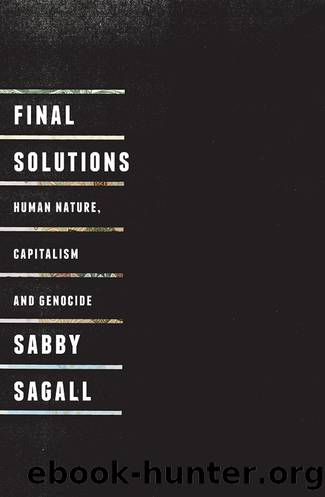Final Solutions by Sabby Sagall

Author:Sabby Sagall [Sagall, Sabby]
Language: eng
Format: epub
Tags: History, Modern, 20th Century, Psychology, Movements, Psychoanalysis, Social Science, Violence in Society
ISBN: 9780745326535
Google: cdoxOwAACAAJ
Publisher: Pluto Press
Published: 2013-10-20T03:34:05+00:00
Military
Large numbers of Scots from the Lowlands border area migrated to Ulster in the seventeenth century. They had grown accustomed to a way of life whose central feature was perpetual warfare. Their main enemies were the Celtic clansmen whom they came to regard as âraiders, pillagers, cattle-thieves, and murderersâ. They became hardened by an almost endless state of war, and âhad no scruples about making merciless reprisalsâ. The result, according to Ford, was that âthe Scots that flocked into Ulster carried with them prepossessions and antipathies implanted by centuries of conflict with predatory clansmenâ.221 Webb too notes that âby the time of the great emigration to America â starting around the turn of the eighteenth century â the Scots-Irish had seen more than 700 years of almost continuous warfare along the border between Scotland and Englandâ.222 James Leyburn provides a similar picture of
outward influences that worked upon the mind and spirit of the Scottish Lowlander: the comparative isolation from the great world, the backward agricultural methods, the centuries of conflict with the English, the particularism of a feudal system that undermined any tendency toward constitutional institutions, the niggardly soil, the meager life of the mind ... The Scot knew famine and plague, thin soil, insecurity of life and property, raids and aggression.223
The Scots developed a hardness âwhich sometimes was not far removed from crueltyâ, a social character which made them amenable to the influence of Calvinism. The Scottish Kirk had removed from its members
any assurance of eternal salvation by the work of the church ... A man's salvation depended upon himself: he must prove himself to be one of God's elect â a congenial doctrine to people who had always believed in self-reliance and a man's importance to himself ... God ... could be reached by any man, however humble, without the mediation of a priest ... God requires an individual to be a man in His presence, standing when he prays, not abjectly kneeling, stating his own case manfully, as he did to his human lord or laird.224
As a consequence, âthe Scot felt reasonably sure that he was among the elect, under God's special protectionâ.225
Ulster had witnessed the overcoming of feudalism with its reliance on traditional authority. The onset of capitalism was giving rise to new distinctions based on property and income. Many Scots immigrants rose up the social scale from the rung of lowly tenant farmers to that of independent farmers, small manufacturers and traders. By the time of the migration to America, many had become middle class and could afford the fare, with enough left over to buy land in the New World. But Ulster Presbyterianism remained rigidly Puritan: âChurch discipline, wherever the Presbyterian church existed in Ulster, was not for an instant relaxed: if anything, its intensity increased during the seventeenth centuryâ, with minute control over personal life, clearly exercised with the general approval of church members.226
The experience of the Scottish Ulstermen prepared them for life on the American frontier. In both places, they lived on land from which the native peoples had been forcibly ejected.
Download
This site does not store any files on its server. We only index and link to content provided by other sites. Please contact the content providers to delete copyright contents if any and email us, we'll remove relevant links or contents immediately.
| Africa | Americas |
| Arctic & Antarctica | Asia |
| Australia & Oceania | Europe |
| Middle East | Russia |
| United States | World |
| Ancient Civilizations | Military |
| Historical Study & Educational Resources |
Cecilia; Or, Memoirs of an Heiress — Volume 1 by Fanny Burney(32550)
Cecilia; Or, Memoirs of an Heiress — Volume 2 by Fanny Burney(31949)
Cecilia; Or, Memoirs of an Heiress — Volume 3 by Fanny Burney(31933)
The Secret History by Donna Tartt(19061)
Sapiens: A Brief History of Humankind by Yuval Noah Harari(14372)
Leonardo da Vinci by Walter Isaacson(13320)
The Radium Girls by Kate Moore(12020)
Sapiens by Yuval Noah Harari(5366)
How Democracies Die by Steven Levitsky & Daniel Ziblatt(5217)
The Wind in My Hair by Masih Alinejad(5092)
Homo Deus: A Brief History of Tomorrow by Yuval Noah Harari(4909)
Endurance: Shackleton's Incredible Voyage by Alfred Lansing(4772)
Man's Search for Meaning by Viktor Frankl(4586)
The Silk Roads by Peter Frankopan(4527)
Millionaire: The Philanderer, Gambler, and Duelist Who Invented Modern Finance by Janet Gleeson(4472)
The Rape of Nanking by Iris Chang(4205)
Joan of Arc by Mary Gordon(4104)
The Motorcycle Diaries by Ernesto Che Guevara(4091)
Stalin by Stephen Kotkin(3960)
